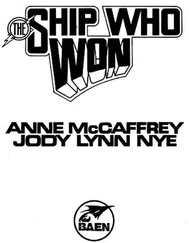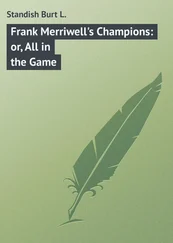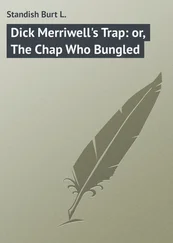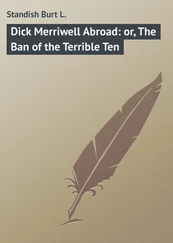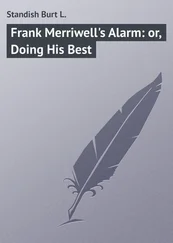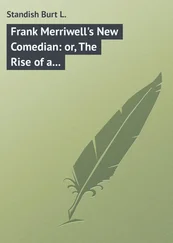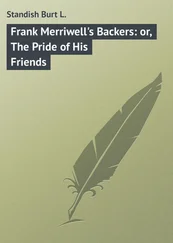Burt Standish - Frank Merriwell's Athletes - or, The Boys Who Won
Здесь есть возможность читать онлайн «Burt Standish - Frank Merriwell's Athletes - or, The Boys Who Won» — ознакомительный отрывок электронной книги совершенно бесплатно, а после прочтения отрывка купить полную версию. В некоторых случаях можно слушать аудио, скачать через торрент в формате fb2 и присутствует краткое содержание. Издательство: Иностранный паблик, Жанр: foreign_prose, foreign_children, на английском языке. Описание произведения, (предисловие) а так же отзывы посетителей доступны на портале библиотеки ЛибКат.
- Название:Frank Merriwell's Athletes: or, The Boys Who Won
- Автор:
- Издательство:Иностранный паблик
- Жанр:
- Год:неизвестен
- ISBN:нет данных
- Рейтинг книги:3 / 5. Голосов: 1
-
Избранное:Добавить в избранное
- Отзывы:
-
Ваша оценка:
- 60
- 1
- 2
- 3
- 4
- 5
Frank Merriwell's Athletes: or, The Boys Who Won: краткое содержание, описание и аннотация
Предлагаем к чтению аннотацию, описание, краткое содержание или предисловие (зависит от того, что написал сам автор книги «Frank Merriwell's Athletes: or, The Boys Who Won»). Если вы не нашли необходимую информацию о книге — напишите в комментариях, мы постараемся отыскать её.
Frank Merriwell's Athletes: or, The Boys Who Won — читать онлайн ознакомительный отрывок
Ниже представлен текст книги, разбитый по страницам. Система сохранения места последней прочитанной страницы, позволяет с удобством читать онлайн бесплатно книгу «Frank Merriwell's Athletes: or, The Boys Who Won», без необходимости каждый раз заново искать на чём Вы остановились. Поставьте закладку, и сможете в любой момент перейти на страницу, на которой закончили чтение.
Интервал:
Закладка:
Burt L. Standish
Frank Merriwell's Athletes; Or, The Boys Who Won
CHAPTER I – FRANK AND HIS FRIENDS
“Say, boys, just listen to that racket!”
It was Jack Diamond who spoke, and he addressed Frank Merriwell and several others of his friends.
“It is certainly awful,” came from Harry Rattleton, one of the boys.
“I can’t stand much of this,” put in Bruce Browning. “It is enough to drive one crazy.”
The boys had just entered the outer portals of a Chinese theatre, located in Chinatown, the Celestial portion of San Francisco. There was a great crowd, and it was only with difficulty that they made their way along the narrow and gloomy passages leading to the theatre proper.
Frank Merriwell and his chums from Yale College had filled in their summer vacation by a trip on bicycles from New York to San Francisco. They had had numerous adventures, but had come out “right side up with care,” as Frank put it.
The party was composed of Frank Merriwell, Harry Rattleton, a former roommate at Yale; Jack Diamond, from Virginia; Bruce Browning, fat, lazy and good-natured; and Toots, a colored boy from the Merriwell homestead.
On reaching California, Frank had fallen in with Bart Hodge, a schoolmate of years gone by, when Frank had attended Fardale Military Academy. Bart had been in serious trouble, and it was Frank who helped him out of it. For some time Hodge had found it best to “keep shady,” and his troubles were not yet a thing of the past.
As the boys walked farther into the entrance of the Chinese theatre, a clanging medley of the most horrible sounds came up from the passage that lay at the foot of a steep flight of stairs.
Frank Merriwell laughed.
“That is music, old fellow!” he said.
Then came another burst of sounds, more horrible than the first, if possible. There was a banging of brass, a clanging of gongs, a roaring of drums, and a wild shrieking and wailing as of ten thousand fiddles cut of tune.
Jack jabbed his fingers into his ears and actually turned pale.
“Music!” he gasped – “that music? That is enough to drive any man crazy! It is the most frightful thing I ever heard. Music! You are joking, Merriwell!”
“Not a bit of it,” declared Frank. “Aren’t we on our way to witness a play in a Chinese theatre?”
“Well, I supposed so, but it strikes me now that this is one of your jokes. You have put up a job on me. You are trying to horse me.”
“Nothing of the sort, my dear boy.”
Jack still continued suspicious.
“Who ever heard of such a way of getting into a theatre?” he exclaimed. “We entered a narrow door in an old building, came through a long, dark passage, climbed stairs, descended stairs, turned, twisted, climbed more stairs, turned again, and now here we are with another flight of stairs before us. A fine way of getting into a theatre!”
“That is the way the Chinese do the trick. Eh, John?”
The Chinaman who had been acting as their guide, and who stood on the first stair, waiting for them to follow him downward, nodded his head, saying:
“Allee samee legler way.”
“It may be the regular way,” admitted Jack; “but I doubt if I could find my way out of here alone. This would be a fine place to run an enemy into if one wished to murder him secretly. There would be little danger that the police would ever find out anything about it.”
Frank made a signal to the guide, and then the trio slowly descended the stairs, which were dimly lighted by paper-shaded lamps.
At the foot of the stairs the boys passed a door that stood open, enabling them to look into a room that was filled with bunks, upon many of which lay Chinamen who were sleeping or smoking opium. The powerful odor of “dope” that came from that room was sickening.
Then they came to an ordinary step-ladder that led downward again.
Jack halted in dismay.
“Why,” he said, “we must be underground now! Where are we going?”
“To the theatre, dear boy. Hear the music.”
“Why will you persist in calling it that? It seems that those sounds come from the infernal regions, and this passage must lead down to the old fellow’s reception-room.”
“Glit to theatal plitty soon,” assured the guide.
Down the ladder they went, and then, at an open door, paid an admission fee, after which they entered a room that was packed with human beings and was not at all well ventilated.
The room had a low ceiling, from which Chinese lanterns were suspended, shedding a soft light over the scene, which was so strange that it actually seemed weird to the American visitors.
At either side of the theatre was a space railed off and raised somewhat above the level of the general floor. This was reserved for women, and was well filled. In the pit sat a closely packed throng of men, all with hats upon their heads.
There were a great number of Caucasian visitors, drawn to the place by curiosity.
The stage was on a level with the raised portion reserved for women, and it was filled with actors, many of whom were richly dressed in oriental robes.
Instead of sitting in front of the stage, like an American orchestra, the musicians were on the stage.
As for scenery, there was none to speak of, save a few movable screens. It was not thought necessary to attempt to please the eye further than in the matter of costumes.
As no female actors are ever permitted on the stage of a Chinese theatre, the female rôles were played by youths, who were carefully made up for their parts.
The Chinese guide found seats for Frank and Jack, but retired himself to the back of the room, where he stood and waited till they should see enough of the show and wish to go.
The audience never applauded, although there was a quick rippling response to what seemed to be an occasional witty passage or clever situation.
But the musicians – the musicians wearied and tortured Jack Diamond’s soul. They were there to accentuate the emotional parts of the play, and they seemed bent upon doing their duty and doing it fully. At times they poured forth a maddening volume of sounds, and then they seemed to get weary and rest, with the exception of two or three stringed instruments, which sawed, and squeaked, and squawled, and growled, and muttered till the Virginian’s blood was cold and his hair standing like porcupine quills.
“Frightful! frightful!” he gasped.
Frank chuckled with satisfaction. It was a new experience for Diamond, and Merriwell was enjoying it as one always enjoys introducing his friends to something new and novel.
“My dear fellow,” whispered Frank, “I fear your ear is not educated to appreciate the beauties of Chinese music.”
“Music! music! Why, a boiler factory in full blast makes better music than this!”
“You are prejudiced. It is a fact that their music is based on ah established scale and a scientific theory.”
“Oh, come! that’s too much! Why, see, those players have no leader, and every man is going it alone for himself. It is exactly the same as if every person in one of our orchestras should play a different tune than anybody else and all play at the same time – only I don’t believe these heathens are playing tunes at all. They are just hammering, and tooting, and sawing away, and letting it go at that.”
“It does seem so,” confessed Frank, “although at certain points they all come together with a grand burst, like sprinters making a dash.”
Jack’s hand dropped on Frank’s wrist.
“Look!” he excitedly whispered, pointing to a Chinaman who had risen amid the spectators at a short distance. “What is that fellow going to do? I saw him conceal a knife in his sleeve.”
Читать дальшеИнтервал:
Закладка:
Похожие книги на «Frank Merriwell's Athletes: or, The Boys Who Won»
Представляем Вашему вниманию похожие книги на «Frank Merriwell's Athletes: or, The Boys Who Won» списком для выбора. Мы отобрали схожую по названию и смыслу литературу в надежде предоставить читателям больше вариантов отыскать новые, интересные, ещё непрочитанные произведения.
Обсуждение, отзывы о книге «Frank Merriwell's Athletes: or, The Boys Who Won» и просто собственные мнения читателей. Оставьте ваши комментарии, напишите, что Вы думаете о произведении, его смысле или главных героях. Укажите что конкретно понравилось, а что нет, и почему Вы так считаете.

